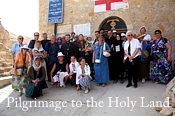By Allen Roy Evans, The Vancouver Sun, Dec. 20, 1941)
We expect the Russian religion to be emotional and mystical. In his own country, this phase of the Russian’s life has been severely restricted for some 20 years. But this brief span cannot eradicate the ingrained religious inheritance of centuries.
So here on a foreign shore the Russian has kept alive both his physical and his religious life. Let us investigate this exotic manifestation in our midst, not too realistically, but clothing our adventure with some degree of imagination. Thus, if we visit the Russian church on the corner of 7th and Fir, let us imagine that the bulbous dome rises from the great cathedral of St. Isaac. Do not view the little turrets with a common pedestrian glance, but see them as the shining minarets of far-off Nijni Novgorod.
Not knowing the time of service, we enter the church at 10:30 a.m. already a long-bearded priest was going through the early ritual. He was clothed in a black cowl and gown and intoned a service peculiar to English ears.
The interior of the church is circular. A segment is cut off by a high ornate screen. Before the screen are several candleholders, crosses and highly colored paintings and lithographs of saints. The stands are covered with bright gold and purple cloths. Every niche and ledge holds its lighted candle.
In a short time the head of the congregation sheds his somber black and sallies forth in gorgeous robes of red, gold and blue. The love of color is a constant reminder that Russia is close to the influence of the Orient.
The congregation remains standing throughout, women and men segregated. Nothing is done in the uniform fashion of Western churches. Each appears to wait for individual impulsion to bow until his forehead touches the floor, or to carry a taper and light it from the candles on the holder. Each taper is fixed in a socket and left burning. Other than this the congregation takes no part in the services. It would only be embarrassing for an outsider to attempt the genuflexions and taper-burnings of the faithful.
The great glory of a Russian church is its music; music without benefit of accompaniment. The choir is invisible somewhere in a rear balcony. They sing out the responses when the priest pauses in his intoning. Judging by the congregation, the choir would not be large, but the volume equals any city choir.
Russian church music is difficult to describe. It is distinctive. Once heard, it could not be mistaken for any other church singing. Is it instinctive or the result of long training? The shading is most remarkable. If you can imagine a peal of bells suddenly ceasing and the resonance or timbre continuing on until it fades, then you have something of the quality. At other times the voices harmonize like great chords from a pipe organ. There is a swelling quality alternating with a diminuendo effect that Russians do to perfection. The bass was especially remarkable.
Many times the priest with the beard swung the censor with its smoking incense. Every icon received its need of incense, not once, but many times. The swinging censor even descended among the congregation. In time the air became laden with the heavy scent.
Let us remember that the Russian’s reverence for religion goes far back into the dim past. The temporary suppression by the Bolsheviks is but a passing phase. The need of the Slav for religion is as old as his history. He will resume it again, perhaps with modification and a varied ritual, but he will come to it once more in his own country. His religion is essentially mystical and as such, it cannot be blotted out with argument.
The Russian has the characteristics of simplicity, a capacity for religion and suffering, and an inextinguishable fatalism. Even today, in this church established on a far, alien shore, the expression of the people is typically sad. It shows a resignation to whatever suffering fate may visit upon them. The Russian is not a joyous worshipper. As the great diapasons swell and fade from the invisible choir, one hears the sweep of lonely winds over the steppes. Darkness and cold and a land where winter dominates life – all this has touched Russian music with the spirit of melancholy.
As I look at the somber faces in this little church, I wonder if they are grateful for a freedom which allows them complete religious liberty. I wonder if they think of the millions of their brothers locked in a death struggle with other millions of the enemy.
The Russian church is reminiscent of old Russia. As I come out from the swirling incense, the deep-toned choir and the intoning of the priest in his gorgeous robes, I half expect a drozhky to be waiting at the door to whisk me across the frozen Neva to the ancient glories of the Winter Palace.
But no, it’s only Vancouver under its sunshine of Sabbath calm. Yet for two hours I have been absent in spirit, freed from the bondage of time and space.

 Russian Version
Russian Version Orthodox Tours
Orthodox Tours Pilgrimage to the Holy Land – 2010
Pilgrimage to the Holy Land – 2010
